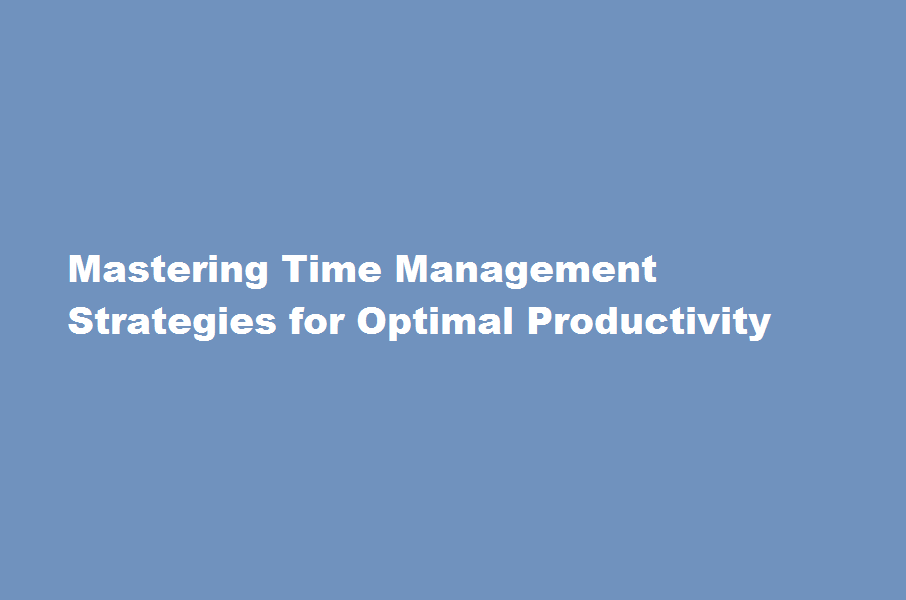Mastering Time Management Strategies for Optimal Productivity
3 min read
Introduction
In today’s fast-paced world, time management has become a crucial skill to achieve personal and professional success. Effective time management allows us to prioritise tasks, reduce stress, and make the most of our limited resources. However, it’s a skill that often eludes many individuals. In this article, we will explore practical strategies and techniques that can help you master time management, enabling you to become more productive and accomplish your goals efficiently.
Set Clear Goals and Prioritise
The foundation of effective time management lies in setting clear goals and priorities. Begin by identifying your short-term and long-term objectives, both personally and professionally. Once you have defined your goals, break them down into smaller, manageable tasks. Determine which tasks are most important and time-sensitive, and prioritise accordingly. Utilise tools like to-do lists or project management apps to stay organised and focused. By having a clear roadmap of what needs to be accomplished, you can allocate your time more effectively.
Avoid Procrastination
Procrastination is the enemy of time management. It’s essential to recognize the habits and factors that contribute to procrastination and take proactive steps to overcome them. Break tasks into smaller, more manageable parts, and tackle them one at a time. Use techniques like the Pomodoro Technique, where you work for a set period and take short breaks in between. Set deadlines for yourself, and hold yourself accountable. By eliminating procrastination, you can make significant strides in managing your time efficiently.
Practice Time Blocking
Time blocking is a powerful technique that involves dividing your day into specific blocks of time for different activities or tasks. Set aside dedicated blocks for focused work, meetings, personal time, and breaks. This method helps create a structured schedule and prevents time from slipping away unnoticed. Remember to be realistic and allocate appropriate time for each task. Additionally, be flexible and willing to adjust your schedule when unexpected events arise. By adhering to a time blocking strategy, you can improve productivity and maintain a healthy work-life balance.
Learn to Delegate and Say No
Recognize that you cannot do everything alone. Delegation is a crucial skill for effective time management. Identify tasks that can be handed off to others, allowing you to focus on more critical responsibilities. Delegating not only helps distribute the workload but also provides an opportunity for others to grow and develop their skills. Similarly, learn to say no to tasks that do not align with your goals or priorities. Politely decline requests that would stretch you too thin and interfere with your ability to manage your time effectively.
Minimise Distractions and Multitasking
Distractions are time thieves that hinder productivity. Minimise external interruptions by turning off notifications on your devices and creating a designated workspace. When working on a task, avoid multitasking, as it can lead to decreased focus and efficiency. Instead, practise single-tasking, giving your undivided attention to one task at a time. Consider using productivity tools like website blockers or time trackers to stay on track. By eliminating distractions and focusing on one task at a time, you can complete tasks more efficiently.
Frequently Asked Questions
What are 5 main aspects of time management?
- Set reminders for all your task
- Create a daily planner.
- Give each task a time limit.
- Establish routine.
- Block out distractions.
What are the 4 P’s of time management?
Now that you understand the importance of time management, let’s explore the four P’s of time management – prioritisation, planning, productivity and positivity.
Conclusion
Mastering time management is a skill that can positively impact all aspects of our lives. By setting clear goals, avoiding procrastination, practising time blocking, delegating tasks, and minimising distractions, we can take control of our time and accomplish more in less time. Remember that time is a finite resource, and how we utilise it determines our success. Be mindful of your choices, habits, and priorities to make the most of the time you have. Implementing these strategies consistently and adapting them to your unique circumstances
Read Also : Say Goodbye to Muscle Cramps Effective Strategies for Relief






